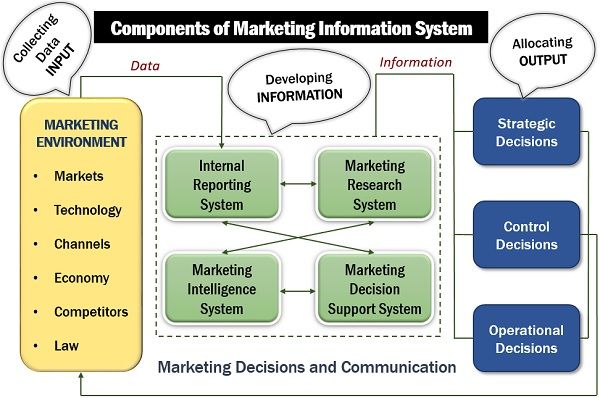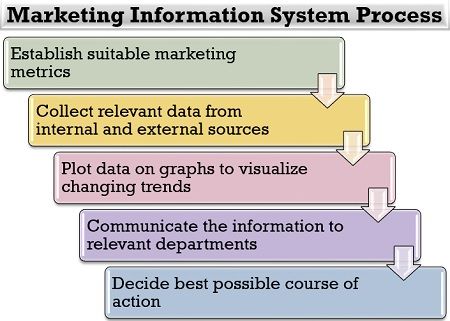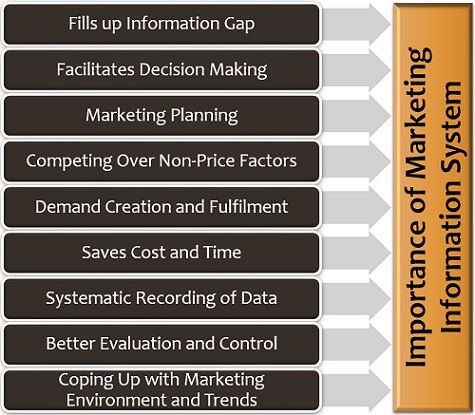Definition: The marketing information system refers to the use of technology for the arrangement of the relevant data related to the market, sales, promotion, price, competition and allocation of goods and service. This information is acquired after a proper analysis and understanding of the marketing environment to ensure effective decision making in the organization.
It majorly deals with the input (i.e., gathering appropriate internal and external data), generating useful information out of it (with the help of the various marketing information system components) and then communicating the outcome so acquired to the decision-makers.
Content: Marketing Information System
Characteristics
The marketing information system is presently used by all kinds of organizations to attain a competitive edge and success in their business.
Let us now understand its multiple features to grab a clear understanding of the concept:

Computer-Based System: In the marketing information system, all the information is gathered, analyzed and communicated through a computer device, and the useful marketing information is stored in microfilms.
Quick, Selective and Accurate Information: The organization can maintain relevant marketing database through marketing information system which can be immediately and accurately accessed anytime.
Easy Accessibility: The information maintained with the help of the marketing information system can be easily viewed and utilized through a computer system.
Inter-related Components: In marketing decisions and communication, all the four components are inter-linked, i.e., the information provided by one element is useful for the functioning of the other aspects.
These interconnected components include internal report, marketing research, marketing intelligence and marketing decision support systems.
Future-Oriented: The marketing information system initiates strategy formulation and planning for future marketing operations.
Supports Decision Making: Since this system provides an accurate marketing database, it can be certainly used for instantaneous decision making, by the marketing managers.
Consistent Information: Marketing information system enables the management and decision-makers to assess relevant, updated and valuable marketing information.
Applicable at All Levels of Management: Every manager uses the marketing information system to decide marketing strategies, plans, policies and procedures prepared at all managerial levels.
Components of Marketing Information System
The marketing information system integrates data collection, processing, analysis, and reporting for streamlining marketing activities using the four primary techniques or components. These components function within a framework of marketing decisions and communication. The following image represents its functioning:

Let us now discuss each of these components in detail below:
Internal Reporting System
The data available in the internal business records available in the various books of accounts on the sales, cash flows, receivables, payables, stock, research, marketing personnel and cost is recorded, analyzed, monitored, compared and communicated to the relevant departments involved in decision making.
Marketing Research System
A marketing research system is an advanced tool which studies the perceived marketing issue or problem. It is done with the help of primary or secondary data collected and presented in tabular format, to draw meaningful conclusions.
It also provides decision-makers with possible solutions and proposes multiple marketing opportunities.
Marketing Intelligence System
The marketing intelligence system collects, analyzes and keeps the organization aware of the daily updates.
These updates include external marketing environment, recent trends, developments, transforming customer needs, technological advancement, competitor’s strategy and market conditions. This leads to prepare for the upcoming challenges and plan for future business opportunities.
Marketing Decision Support System
In marketing decision support system, various mathematical and economic tools (regression, linear programming, optimization, statistics, time series analysis, etc.) are used to process, analyze and convert the raw data to obtain useful marketing information to support the decision-making activities.
Types of Marketing Decisions
The marketing information system is all about making a correct decision by the marketing personnel at the right time to serve the organizational objectives.
Following are the three major marketing decisions taken with the help of the marketing information system:
Strategic Decisions
The higher-level managers make such decisions since these are related to the organizational objectives, structure and policies which are crucial and affects the whole organization.
E.g. Decisions concerning global marketing and market acquisition.
Control Decisions
These are the fundamental managerial decisions which are taken as corrective actions (by middle-level managers) in case of any deviation. This preceded by proper evaluation and monitoring of the implementation of the strategic plans so formed by the higher-level managers.
E.g. adopting a suitable marketing strategy for potential market acquisition.
Operational Decisions
These decisions deal with the day to day activities performed for the accomplishment of specific tasks (such as proper utilization of resources), essential for adequate implementation of the plans formed by top and middle-level managers.
E.g. directing the efforts of the sales team towards the successful application of the marketing strategy so decided.
Marketing Information System Process
To know how a marketing information system operates, please go through its sequential process, given below:

Since every piece of information involves some opportunity cost as well as a real cost. It is essential to wisely select the subject or area requiring the application of a marketing information system and deciding a suitable metrics, accordingly.
Next comes the collection of required data as per the selected metrics from various internal sources (books of accounts, a sales record, sales reports and analytics) and external sources (customer surveys, economic or financial metrics, social media insights and competitor results).
Then, the gathered data needs to be organized and plotted systematically on a graph to facilitate comparative analysis, future prediction and interpretation.
The fourth step is to communicate the graphical information to the various departments for a better interpretation and analysis of the available data and the determination of multiple alternatives (decisions) as per organizational goals.
The last step is to decide the best possible course of action of the marketing metrics and applying it to the business to enhance the marketing results.
Importance of Marketing Information System
The marketing information system has simplified the task of decision making for the marketing managers and has also provided as a useful tool for strategic planning of the business activities.
Let us now understand its various other benefits:

Fills up Information Gap: Marketing information system facilitates the companies involved in global retailing and other international trade practices. The purpose is to meet their information needs and being aware of the world-wide scenario.
Facilitates Decision Making: It is a useful tool for future decision making involving the strategic, operational and control related decisions.
Marketing Planning: Marketing information system assesses the market demand and prospective sales to ensure effective planning of the marketing operations.
Competing Over Non-Price Factors: MIS is used for adopting non-price competition strategies. It facilitates brand image, product customization, product differentiation, public relations, additional services, etc., to retain consumers without any price war.
Demand Creation and Fulfilment: It also provides information on customer requirements. Thus, generating the need for those products which are desired by the consumer’s subconscious mind, through marketing research and then meeting such needs in reality.
Saves Cost and Time: Marketing information system targets the problem area and take desired decisions to avoid the wastage of time, cost and efforts on unnecessary activities.
Systematic Recording of Data: It provides for an orderly arrangement of the gathered data to provide useful information for further marketing planning and decision making.
Better Evaluation and Control: Marketing information system helps to monitor and evaluate the marketing operations and programmes. It also provides for taking corrective actions in case of not acquiring the desired outcomes.
Coping Up with Marketing Environment and Trends: It regularly keeps an eye on any changing trends in the economic, political, technological and competitive environments. It helps to grab new opportunities and prepare for the upcoming challenges.
With the development of technology and modernization, the management of business activities has become a lot more simple than it was before. We can now keep up with the current happenings and recent trends on our computer systems with just a simple click.
leval Ainah says
Thanks for an excellent post. This is well articulated. Thank you so much for your insightful and relevant article. It has increased my knowledge about marketing information system